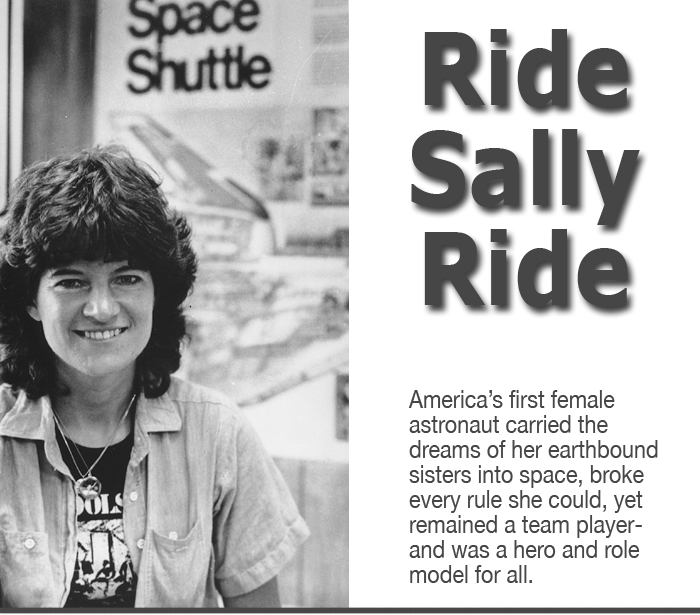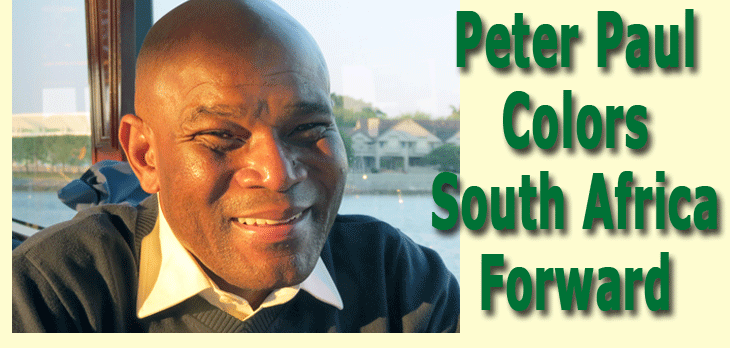
 Naples,
Florida, is as unlikely a place as you might expect
to meet someone who has seen it all and lived to tell
about it, but there I was aboard a big dinner cruise
boat—the kind that push gamblers out beyond
U.S. jurisdiction to play games of chance and are
also available to host company events—having
a once-in-a-lifetime encounter. Naples,
Florida, is as unlikely a place as you might expect
to meet someone who has seen it all and lived to tell
about it, but there I was aboard a big dinner cruise
boat—the kind that push gamblers out beyond
U.S. jurisdiction to play games of chance and are
also available to host company events—having
a once-in-a-lifetime encounter.
While everybody else
was getting jolly at the open-deck cocktail hour,
I was down below in the dining salon checking out
the grub. It was there that I noticed a well-dressed
gentleman, slight of frame, sitting at a corner table
all by himself.
I am not one to allow
for loneliness at a party. It just doesn’t sit
well with me. My instinct to engage was only further
solidified by the fact that this perfectly nice looking
gentleman was black. I must say, I cannot remember
the last time I saw a black person at an air cargo
event, let alone at a management level meeting or
an industry party.
My instinct to engage
goes rather hand in hand with my desire to cut to
the chase—a desire that has both expanded my
horizons and perhaps at times put me in a pickle.
Fortunately, that night was an adventure in the former.
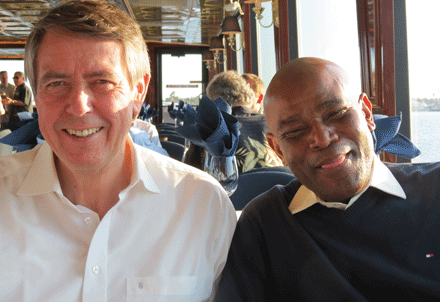 I
walked right up to the gentleman and said: I
walked right up to the gentleman and said:
“We don’t
see too many people of color at air cargo events.”
His face broke into
a broad grin, all smiling eyes, as he looked at me—Mr.
American Cheese on White—and munching on a hard
roll, laughed out loud and said:
“I almost didn’t
make it here… you know I am still on the TSA
terrorist list?”
“You know,”
said his friend and host on the boat ride, Jo Frigger,
(in photo left) CEO of EMO Trans, “you’re
speaking to Sibusiso Peter-Paul Ngwenya, who spent
plenty of time disturbing the peace, blowing up rail
lines, and otherwise caused all manner of disruption
in South Africa during Apartheid.”
“I wasn’t
easy,” said the 57-year-old Peter Paul.
“I spent seven
years of a fifteen year sentence in jail with Nelson
Mandela and was not released from Robben Island until
1991.”
There I was, riding
on a dinner boat off the golden-age coast of white
privileged Florida, speaking to a man who gave up
part of his life to help millions and secure the freedom
for what is now the new South Africa.
Robben Island was first
used as a political prison in the mid 17th century,
a place that housed convicts, slaves, and indigenous
people who would not adhere to colonial rule. For
30 years (from 1961-1991) it was used as a maximum-security
prison for apartheid fighters. It is now a museum
where visitors can see the 7-by-9-foot cell that held
Nelson Mandela, a room that Mandela wrote about in
Long Walk to Freedom: “When I lay down,
I could feel the wall with my feet and my head grazed
the concrete on the other side.”
Today Peter Paul’s
selfless patriotism to South Africa has developed
into several business ventures, including Engen, South
African Breweries, and the investment company Makana
Trust, where he is a founding trustee and former chairman.
He later co-founded
Makana Investment Corporation, of which he is the
current executive chairman.
Peter-Paul is the treasurer
of the Ex-Political Prisoners Committee.
He is also the chairman
of South African Airlink, radio stations Heart 104.9
and Igagasi 99.5, and Sebenza Forwarding and Shipping
Consultancy.
Sebenza Forwarding and
its long standing partnership with EMO Trans has brought
him this day all the way from the head office in Johannesburg
via Dubai to Naples, Florida.
“You know,”
Peter Paul confided, “we have a real challenge
with our forwarding business.
“When Apartheid
ended and the balance of business ownership and positions
in various companies came to be more racially representative
of more than 80 percent of the population, the move
was to put people in positions they may have been
less than qualified to hold.
“Consequently,
I am here in the USA looking for management-level
expertise that is willing and qualified to both work
and make a career in South Africa while we build our
cargo infrastructure and expand our transportation
expertise today and for future generations.
“Our business
in 2012 has not been that good; in fact, we are struggling.
“But there are
lots of opportunities in South Africa,” Peter
Paul insisted.
“Part of our problem
is that there are so few trained people.
“We have lost
key people to various factors, including to the competition,
so replacement is quite difficult.
“South Africa
is a major trading partner to other African countries,
including for example, Zimbabwe and Mozambique.
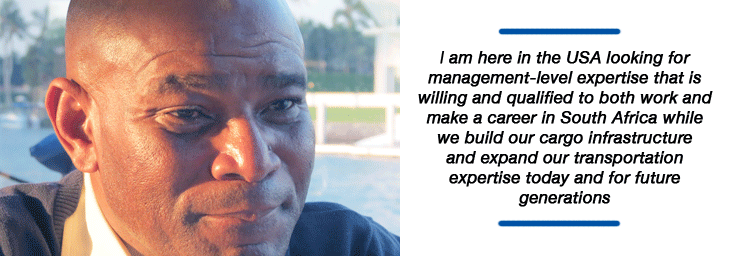 |
“With continued
interest in the African market from everywhere else
in the world, the talent pool for logistics personnel
is greatly challenged for everyone at home.”
Looking ahead, Peter
Paul just put the finishing touches on an autobiography
of his life, expected out later this year.
Here is a man whose
life began in poverty and repression, and who has
now blossomed into generating business and creating
civic greatness in his homeland. His pride and strength
were instantly recognizable just in talking to him.
It is too easy to overlook
people like Peter Paul, because they make what they
do look so simple.
We are so glad that
didn’t happen on that big party boat in Florida,
when the great Peter Paul and his vision of a thousand
tomorrows sat undetected, a quiet hero amid a crowd
of revelers.
Geoffrey |



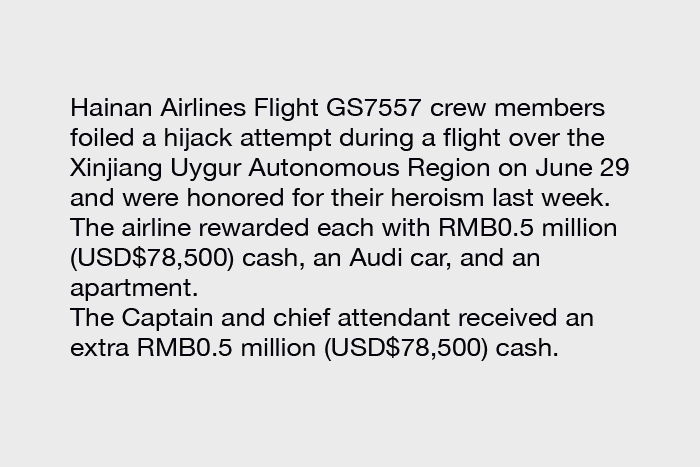



 Naples,
Florida, is as unlikely a place as you might expect
to meet someone who has seen it all and lived to tell
about it, but there I was aboard a big dinner cruise
boat—the kind that push gamblers out beyond
U.S. jurisdiction to play games of chance and are
also available to host company events—having
a once-in-a-lifetime encounter.
Naples,
Florida, is as unlikely a place as you might expect
to meet someone who has seen it all and lived to tell
about it, but there I was aboard a big dinner cruise
boat—the kind that push gamblers out beyond
U.S. jurisdiction to play games of chance and are
also available to host company events—having
a once-in-a-lifetime encounter. I
walked right up to the gentleman and said:
I
walked right up to the gentleman and said: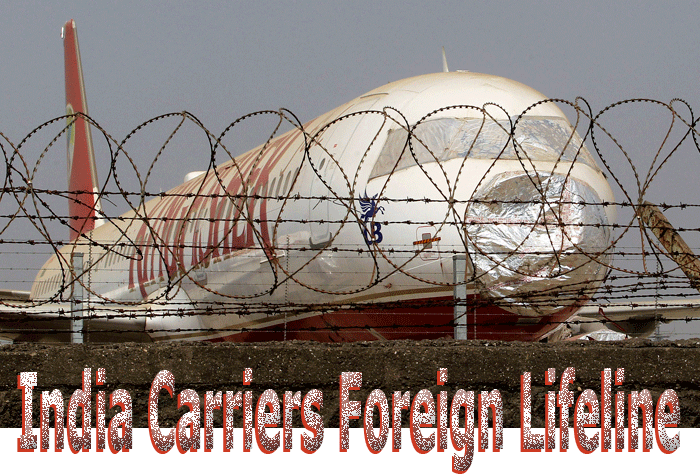
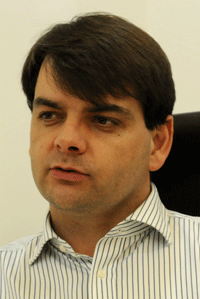 In
fact, this correspondent spoke to low-cost carrier
SpiceJet's CEO Neil Mills, (right) and he said:
In
fact, this correspondent spoke to low-cost carrier
SpiceJet's CEO Neil Mills, (right) and he said:
